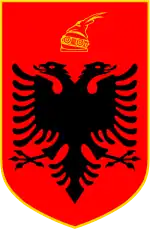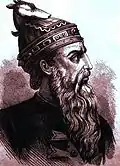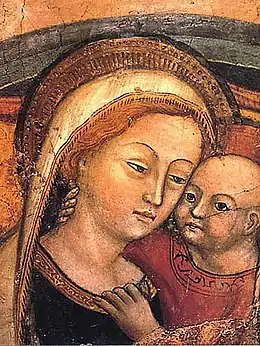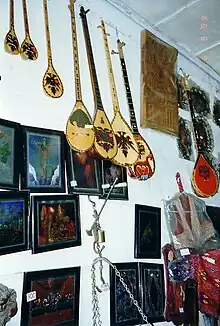The national symbols of Albania are symbols that are used in Albania to represent what is unique about the nation, reflecting different aspects of its culture and history. The symbols may also be used in the Kosovo, North Macedonia, Montenegro, Greece (Chameria), Serbia (Preševo Valley) and by the Arbëreshë in Italy.
Official symbols
| Type | Image | Symbol |
|---|---|---|
| National flag[1] |  |
Flag of Albania
The flag of Albania (Albanian: Flamuri i Shqipërisë) is a red flag with a black double-headed eagle in the centre. A banner with a double-headed eagle is attested as having been used by several Albanian principalities since the early Middle Ages such as the Muzaka, Thopia, Kastrioti and Dukagjini families.[2][3][4] |
| National colours |  |
Red and Black
Red and black was used much earlier but officially by the League of Lezhë (1444–1479). |
| Coat of arms[1] |  |
Coat of arms of Albania
Adopted by Albanian Parliament in 1992. |
| National anthem[1] | Himni i Flamurit
"Himni i Flamurit" was the anthem of the all Albanian states since 1912, composer Romanian Ciprian Porumbescu. Original title "Pe-al nostru steag e scris Unire". Lyrics translated in Albanian by the Romanian of Albanian origin poet Victor Eftimiu. | |
| National motto | Ti Shqipëri, më jep nder, më jep emrin Shqipëtar
You, Albania, give me honor, give me the name Albanian | |
| National animal/bird |  |
Eagle
The eagle is the national and ethnic symbol of the Albanians, considered an animal totem associated with freedom and heroism in their folklore. It has been used as a national symbol since their earliest records, and was a common heraldic symbol for many Albanian dynasties in the Late Middle Ages.[5][6] |
Unofficial symbols
| Type | Image | Symbol[7] |
|---|---|---|
| National hero |  |
Gjergj Kastrioti |
| National flower |  |
Red Poppy |
| National tree |  |
Olive |
| Patron saint |  |
Our Lady of Good Counsel |
| National instrument |  |
Çiftelia |
 |
Lahuta | |
| National clothing |  |
Qeleshe/Plis |
 |
Opinga | |
.jpg.webp) |
Fustanella | |
See also
References
- 1 2 3 FLETORJA ZYRTARE E REPUBLIKËS SË SHQIPËRISË. "PËR FORMËN DHE PËRMASAT E FLAMURIT KOMBËTAR, PËRMBAJTJEN E HIMNIT KOMBËTAR, FORMËN DHE PËRMASAT E STEMËS SË REPUBLIKËS TË SHQIPËRISË DHE MËNYRËN E PËRDORIMIT TË TYRE" (PDF). qbz.gov.al (in Albanian). Tirana. pp. 2, 14. Archived from the original (PDF) on 2016-08-04. Retrieved 2017-12-16.
- ↑ Hasan Celâl Güzel; Cem Oğuz; Osman Karatay; Murat Ocak (2002). The Turks: Ottomans (2 v. ). Yeni Türkiye. p. 2v. ISBN 9789756782583.
Albanian tribes such as Bua, Muzaka ... Kostandin Muzaka
- ↑ Fine, John V. A. (1994). The Late Medieval Balkans: A Critical Survey from the Late Twelfth Century to the Ottoman Conquest. University of Michigan Press. p. 290. ISBN 978-0-472-08260-5.
- ↑ Antonina Zhelyazkova (2000). "Albanian Identities" (PDF). pdc.ceu.hu (in Albanian). p. 4.
- ↑ Minahan, James (2010). The Complete Guide to National Symbols and Emblems. pp. 301–302. ISBN 9780313344978.
- ↑ Elsie, Robert (2001). A Dictionary of Albanian Religion, Mythology and Folk Culture. London: Hurst & Company. p. 78. ISBN 1-85065-570-7.
- ↑ James Minahan (23 December 2009). The Complete Guide to National Symbols and Emblems. ABC-CLIO. pp. 301 – , 304. ISBN 978-0-313-34497-8. Archived from the original on 30 September 2023. Retrieved 30 September 2023.